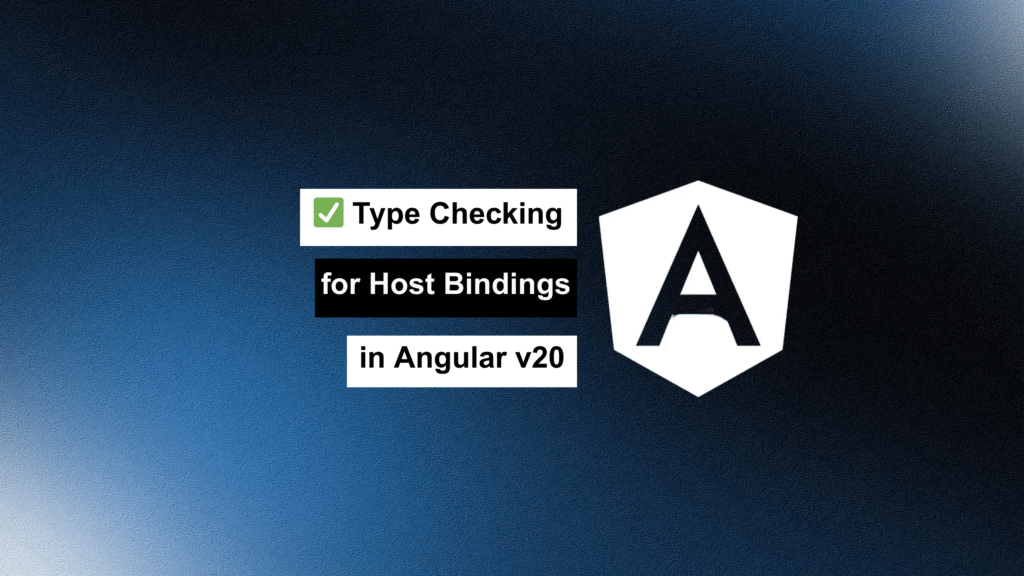
One of my favorite features in Angular v20 is something we’ve all been silently hoping for: type checking for host bindings. It’s the kind of upgrade that doesn’t scream flashy, but delivers serious value — especially if you care about stability, DX, and catching bugs early.
Here’s why this change matters and how it can instantly improve the way you write Angular components.
🤔 What Are Host Bindings (and Why Should You Care)?
In Angular, host bindings allow you to hook directly into the DOM element hosting your component or directive — for setting attributes, classes, or listening to events.
A common example:
@Component({
selector: 'post',
template: '',
host: {
'[attr.title]': 'prefix + doesNotExist',
},
})
export class PostComponent {
prefix = 'Hello';
}
Looks innocent, right? But here’s the problem: doesNotExist isn’t defined anywhere in the class. Before Angular v20, this kind of typo wouldn’t throw any compile-time error. You’d only notice it when something breaks at runtime — if you noticed at all.
😬 What Went Wrong Before Angular v20
In earlier Angular versions, host bindings were not type-checked by the compiler. That meant:
- Typos in bindings could silently pass
- Invalid references went undetected
- Runtime bugs were harder to trace
And in large apps, those small mistakes? They compound fast.
✅ Angular v20 Fixes This — Finally
Angular 20 now type-checks host bindings. This applies to:
hostmetadata in@Componentand@Directive@HostBindingdecorators@HostListenerdecorators
🔎 What You Get:
- Compile-time errors if a referenced property doesn’t exist
- IDE autocompletion and inline hints for host metadata
- Consistent type safety across your entire component — template and host
🧠 Example: Now You’ll See This
Property 'doesNotExist' does not exist on type 'PostComponent'.
That’s the kind of early feedback I want while coding.
🛠 Real-World Use Case: @HostBinding
Let’s say you’re binding classes and attributes with @HostBinding:
@HostBinding('attr.role') role = 'button';
@HostBinding('class.invalid') invalidClass;
Before Angular 20, even if invalidClass was never declared or initialized, Angular wouldn’t care — no error, just silent failure.
Now, with v20:
@HostBinding('class.invalid') invalidClass; // ✅ Type checked!
If you mistype or forget to define invalidClass, the compiler flags it. Instantly.
🧬 Under the Hood: How It Works
This is all thanks to enhancements in Angular’s Ivy compiler. The same type-checking engine that powers template validation now extends to host bindings.
That includes:
- Host object literals in metadata
- Class properties decorated with
@HostBinding - Event listeners using
@HostListener
Now host bindings behave like templates — smart, safe, and type-aware.
🌍 Who Benefits Most?
Pretty much everyone writing Angular, but especially:
- Teams working in large codebases — where small mistakes can cost big
- Enterprises focused on maintainability and QA
- Developers who value static analysis and reliable tooling
- Projects that use strict mode or enforce strong typing rules
🚀 Final Thoughts
This feature might not steal the headlines, but it’s one of those quality-of-life improvements that changes everything. Type checking for host bindings:
- Prevents silent runtime bugs
- Speeds up dev feedback with IDE integration
- Brings consistency across the Angular experience
It’s one more reason Angular 20 feels like a real step forward — modern, reactive, and developer-first.
🏷️ TL;DR
- Angular v20 type-checks:
hostmetadata@HostBinding@HostListener
- Catch typos at compile time, not runtime
- Better tooling, fewer bugs, cleaner code
